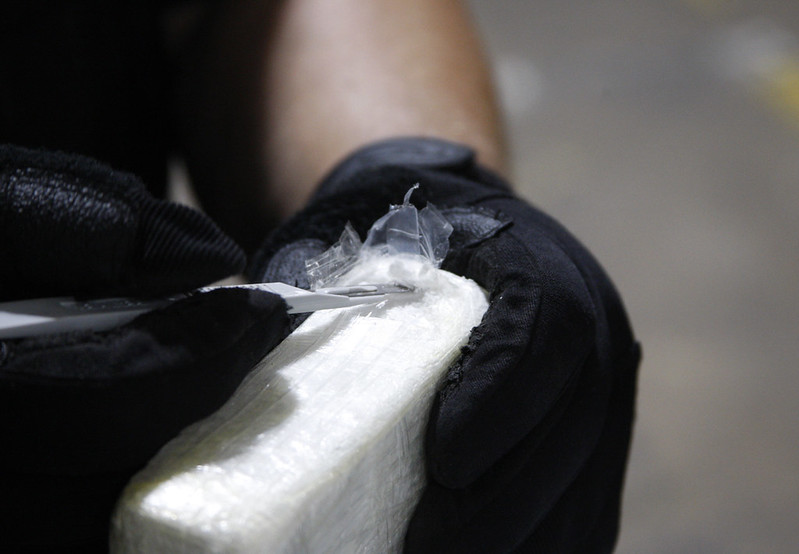Narcos in the time of Covid-19
Posted By Gareth Rice on April 21, 2020 @ 06:00

In a break from the usual content of the daily White House press briefings on Covid-19, on 1 April the US defence secretary, Mark Esper, announced an increase in military assets [1] assigned to US Southern Command in an effort to stop illicit-drug traffickers from exploiting the ongoing crisis.
Chairman of the Joint Chiefs of Staff General Mark Milley offered a stark warning [2] to the cartels: ‘You will not penetrate this country … You’re not going to come in here and kill additional Americans. And we will marshal whatever assets are required to prevent your entry into this country to kill Americans.’
It’s unclear what intelligence prompted this response; however, it poses interesting questions about how drug cartels might seek to capitalise on the coronavirus pandemic. While any crisis that consumes national focus offers opportunities for organised crime, the unprecedented nature of this particular crisis means there’s no real historical reference point for dealing with the problem. It seems likely, though, that drug-trafficking organisations will face their fair share of challenges (as well as opportunities) as this pandemic unfolds.
Since the majority of illicit drugs enter the US through recognised ports of entry, the reduced traffic between Mexico and the US will force traffickers to use other, less efficient smuggling corridors. Competition for access to these corridors will undoubtedly lead to violence between cartels. We may already be seeing evidence of this playing out—Mexico had a record high of 2,585 homicides [3] in March.
Global supply lines have been disrupted and early reports from eastern and southern Africa [4] indicate an increase in heroin prices combined with a reduction in purity. There are also reports that the Sinaloa cartel [5] is experiencing shortages in precursor agents—which generally come from China—for the production of methamphetamines and fentanyl.
An interruption to the supply of fentanyl is likely to be one positive for the US, which reported roughly 50,000 fatalities [6] from opioid-involved overdoses in 2018.
On the demand side, reduced street traffic in cities with quarantine measures will put dealers and users under pressure in ways that may significantly alter traditional distribution methods. It’s also unclear if social isolation will result in a decline in recreational drug use. People with more serious addictions, however, will likely seek out alternatives such as prescription medications if the illicit-drug supply continues to be disrupted.
As British journalist and lecturer Ian Hamilton wrote recently [7], ‘People don’t behave rationally in these situations, whether it’s about the supply of toilet roll or cocaine.’
Like any business, drug cartels will look to innovate in order to survive. Whereas organised crime more broadly has seen an increase [8] in cybercrime and the counterfeiting of medical equipment, drug cartels may simply leverage their expertise in human trafficking and extortion.
In any case, the new restrictions on movement across international borders will test even the most resilient trafficking networks. This provides unique opportunities for law enforcement, but also risks encounters with organisations that may be becoming increasingly desperate and violent.
In a bizarre demonstration of apparent social responsibility, drug gangs recently enforced curfews in parts of Brazil [9] and El Salvador [10] in the absence of government action to prevent the spread of the pandemic. Similar actions were seen in Venezuela [11] by the group Colectivos, which is loyal to President Nicolas Maduro, who, coincidently, was recently indicted by the US government [12] on charges of ‘narco-terrorism’.
Drug cartels wielding state-like power isn’t a new phenomenon in Latin America, though its use in response to a pandemic certainly is. How well these organisations respond to the crisis will likely determine the level of ongoing support they get from the communities that ensure their survival.
So far, Australia’s illicit-drug supply doesn’t appear [13] to have been significantly disrupted. With the bulk of drugs arriving through international mail or air cargo [14], it’s unlikely that there will be any drastic changes in trafficking methods due to the pandemic, although recent seizures in Myanmar [15] and shortages of precursors globally could cause at least a temporary decline in domestic drug supply.
In the US, the administration’s decision to increase the military and law enforcement presence near the southern border was probably a wise move that may already be paying off [16]. If it is coordinated effectively, it could prove to be devastating for drug cartels that are likely to be under increased pressure to move whatever product they have available.
In more normal times, this would provide a unique opportunity for international cooperation against a common threat. But these are not normal times.
Article printed from The Strategist: https://www.aspistrategist.org.au
URL to article: https://www.aspistrategist.org.au/narcos-in-the-time-of-covid-19/
URLs in this post:
[1] announced an increase in military assets: https://www.youtube.com/watch?v=39vpGAx6F6c
[2] warning: https://www.whitehouse.gov/briefings-statements/remarks-president-trump-vice-president-pence-members-coronavirus-task-force-press-briefing-16/
[3] record high of 2,585 homicides: https://www.theguardian.com/world/2020/apr/05/major-drug-gang-shootout-leaves-19-dead-in-northern-mexico
[4] reports from eastern and southern Africa: https://globalinitiative.net/wp-content/uploads/2020/03/CovidPB1rev.04.04.v1.pdf
[5] reports that the Sinaloa cartel: https://www.vice.com/en_us/article/bvgazz/sinaloa-cartel-drug-traffickers-explain-why-coronavirus-is-very-bad-for-their-business
[6] 50,000 fatalities: https://www.rand.org/pubs/research_reports/RR3117.html
[7] wrote recently: https://www.independent.co.uk/voices/coronavirus-lockdown-drugs-essential-goods-addiction-consumption-rooms-a9420521.html
[8] increase: https://rusi.org/commentary/how-covid-19-changing-organised-crime-threat
[9] Brazil: https://www.theguardian.com/world/2020/mar/25/brazil-rio-gangs-coronavirus
[10] El Salvador: https://www.latimes.com/world-nation/story/2020-04-07/el-salvador-coronavirus-homicides-bukele
[11] seen in Venezuela: https://www.elnacional.com/venezuela/los-colectivos-te-mandan-a-casa-asi-se-vive-la-cuarentena-en-el-23-de-enero/
[12] indicted by the US government: https://www.abc.net.au/news/2020-03-27/trump-indicts-venezuela-nicolas-maduro-narco-terrorist/12094878
[13] doesn’t appear: https://www.smh.com.au/national/nsw/highs-and-lows-of-drug-trade-and-organised-crime-in-the-wake-of-pandemic-20200412-p54j3x.html
[14] international mail or air cargo: https://www.acic.gov.au/sites/default/files/illicit_drug_data_report_2017-18.pdf?v=1564727746
[15] recent seizures in Myanmar: https://frontiermyanmar.net/en/sea-of-meth-as-myanmar-army-smashes-three-drug-labs
[16] may already be paying off: https://www.southcom.mil/MEDIA/NEWS-ARTICLES/Article/2147736/us-coast-guard-international-partners-seize-1700-pounds-of-cocaine-off-central/
Click here to print.